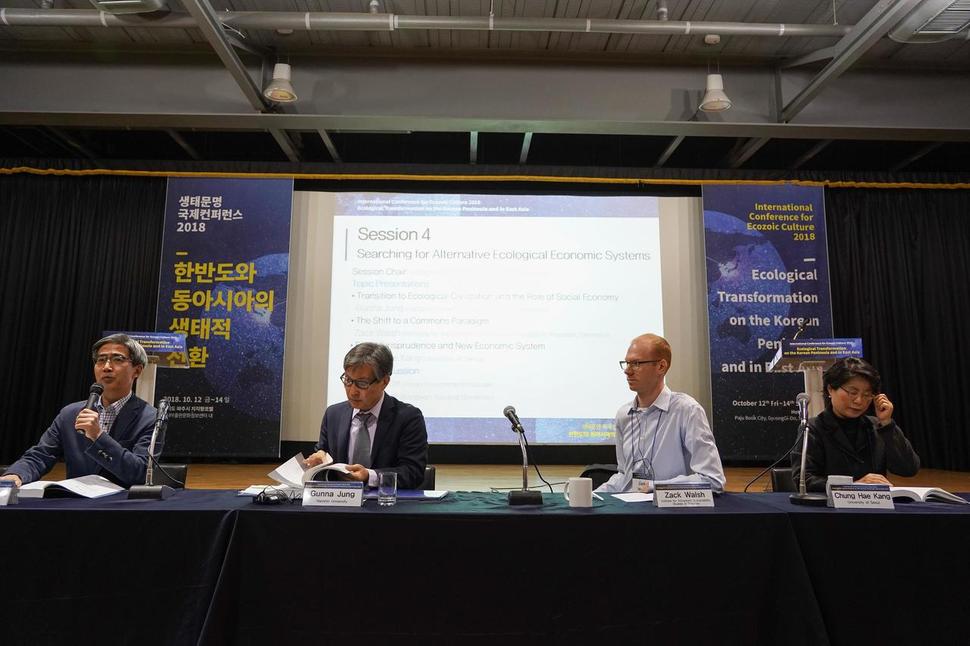Is an Economic System in Harmony with Ecology Possible?

By Han Gui-Young 한겨레경제사회연구원 사회정책센터장
People for Earth Forum “Earth and People” hosts International Conference on Ecological Civilization
If the entire world is to maintain Korea’s level of consumption, 3.5 earths will be needed
Ecological conversion is no longer a task that cannot be postponed
Immediately effective ecological conversion is more cost effective as well
Practical application such as “cooperative sharing society” is already active
The 2018 International Conference on Ecological Civilization was held from October 12th to 14th in Paju City, Gyeonggi-do. The goal of the conference was to diagnose earth’s limits and seek alternatives towards an ecological civilization. The first gathering taking place in 2016, the annual forum was hosted by the People for Earth Forum (Representative Kang Kum-sil) this year, under the theme of “Ecological Transformation of the Korean Peninsula and East Asia.”
Last summer, Koreans experienced the highest average temperature on record. In the spring we suffered from ultra-fine dust that threatened our right to breathe, and this winter is predicted to bring extreme cold. Such abnormal temperatures are signs of the ecological crisis we face; the price we pay for making economic growth our top priority. Korea has benefited much as a latecomer to the industrial civilization, and it is one of the countries causing the most harm to the planet. “Since 1970, the environmental burden caused by Korea has already exceeded the level of an ecological footprint. The ratio of Korea’s biocapacity to its ecological footprint is 800%, which means that if all the nations of the world were to maintain Korea’s level of consumption, they would need 3.5 earths.” This is the diagnosis provided by Kim Jong-ho, a panelist at the forum and a senior researcher at the Korea Institute of Environmental Policy. Given that exceeding the ecological capacity by more than 150% is considered serious ecological debt, an ecological transition cannot be delayed.The question is whether an economic system that harmonizes economy and ecology is possible in an industrial society.
Professor Jung Gunna of Hanshin University (Economics), who gave a presentation on “The role of the social economy in the transition to ecological civilization,” said, “If economic growth and ecological considerations were raised together, usually the economy would win. Before the great objective of growth, ecology was considered trivial and even extravagant.” Climate change is a representative example. According to Naomi Klein, author of This Changes Everything, named by The New York Times to be one of the most important environmental works, “Climate change is a war between capitalism and the earth, and capitalism has always easily won.” Voices of concern about climate change were always drowned out by the immediate dictates of growth and prosperity. This is why we need a great transformation on the civilizational level for real change. It is urgent to imagine and conceive of a new economy that harmonizes with ecology.
The integration of ecology and economy is not only normatively desirable, but also critical on the practical level. According to the Stern Report, in which U.K. economist Nicholas Stern warns of the danger of global warming, “humanity must pay 5~20% of our total GDP for the costs of climate change, accounting for all the risks and effects that have already come to pass. But if we act now, the cost of avoiding the worst-case scenario is but 1% of the total GDP.” Acting immediately stands to reason even from the economic evaluation of a cost-benefit analysis.
Professor Jung Gunna highlighted a ‘collaborative shared society’ as an alternative economic system. This concept was proposed by American social critic Jeremy Rifkin and has already come into our everyday economic lives in various forms — including housing, care, renewable energy,and urban agriculture. Practices that distinguish themselves from the profit-oriented capitalist economy, such as cooperatives, social enterprises,the sharing economy, community finance, and local currency are already active in many places.
Zack Walsh, a researcher at the Institute for Advanced Sustainability Studies (IASS) in Germany, said, “Capitalism has been sustained because of a lack of sharing. The unpaid work of women is a representative example. Capitalism has never recognized sharing practices as valuable.” The recent explosion of sharing-based economics is a practical response to a crisis. “In order for the transformation into a sharing paradigm to be genuine,it must include a societal and cultural change. We are developing the Contemplative Commons project, an experiment that explores how psychological, social, and mental patterns change in shared-based systems.
The practical search for a new economic system is also emerging in the field of law. Kang Jung-hye, a professor at Seoul City University (Jurisprudence), cited Thomas Barry’s “Earth Law” as an alternative to the “current economic system, which fails to include the health and vitality of various living systems and beings. The present system of law elevates only the inherent dignity of human beings, excluding greater principles of the functioning of the earth or the universe. The new paradigm of law must elevate the earth community over the earth community and introduce a new legal system.”According to such Earth Jurisprudence, we must give legal personhood to beings such as the earth, animals, plants, mountains, rivers, lakes, etc. “We want to include them as a component of the economic system so that their rights and interests are not violated.”
The International Forum for Ecological Civilizations, which took place over the course of three days, was concluded with the Declaration of Paju for ecological transformation.
This article was originally published in Korean. Go here to read the original text.
